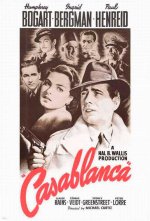No one at Warner Brothers initially thought of
Casablanca as anything other than just another film, in spite of its almost all star cast.
The film's release/premiere was pushed up to November of '42 in order to coincide with the invasion of North Africa and the capture of Casablanca. It'd originally been scheduled for release sometime in 1943.
Casablanca isn't really film
noir, though it has some
noir elements...they just don't pervade the whole film (my opinion). It's basically a wartime romance-thriller film, and if you
really want to get technical, it's the story of a love triangle...the two men are competing for Ilsa's love. There were some initial worries about censorship, too. It isn't hard to imagine that Ilsa slept with Rick in order to get the letters of transit...and with the Hays Office censors peeking around every corner of the studio, that idea was a big no-no. So the idea is sort of sanitized, but there's no denying the
intent.
Some of the cast were actual refugees from Hitler's Germany. Even Conrad Veidt, who played Strasser, was a German actor who'd fled the country...and ironically ended up continuing to be cast as a Nazi in American films. S. Z. Sakall, who played the waiter Carl, was a Jewish-Hungarian who fled Germany in 1939. His three sisters died in a concentration camp.
It's a landmark film, and totally would
not have worked (in my opinion) if it'd been shot in colour. The black and white reinforces the drama for me.
The stunningly beautiful Madeleine LeBeau was the last surviving player in Casablanca. She played Yvonne, Rick's jilted lover, and becomes very emotional when singing "La Marseillaise" in Rick's cafe. She was only about 21-years-old when she played Yvonne. She and her husband (who plays the croupier at the roulette table) had escaped from Nazi-occupied France. She died in 2016, at the age of ninety-two.
Oh, and no one in the film
ever says "Play it again, Sam."









